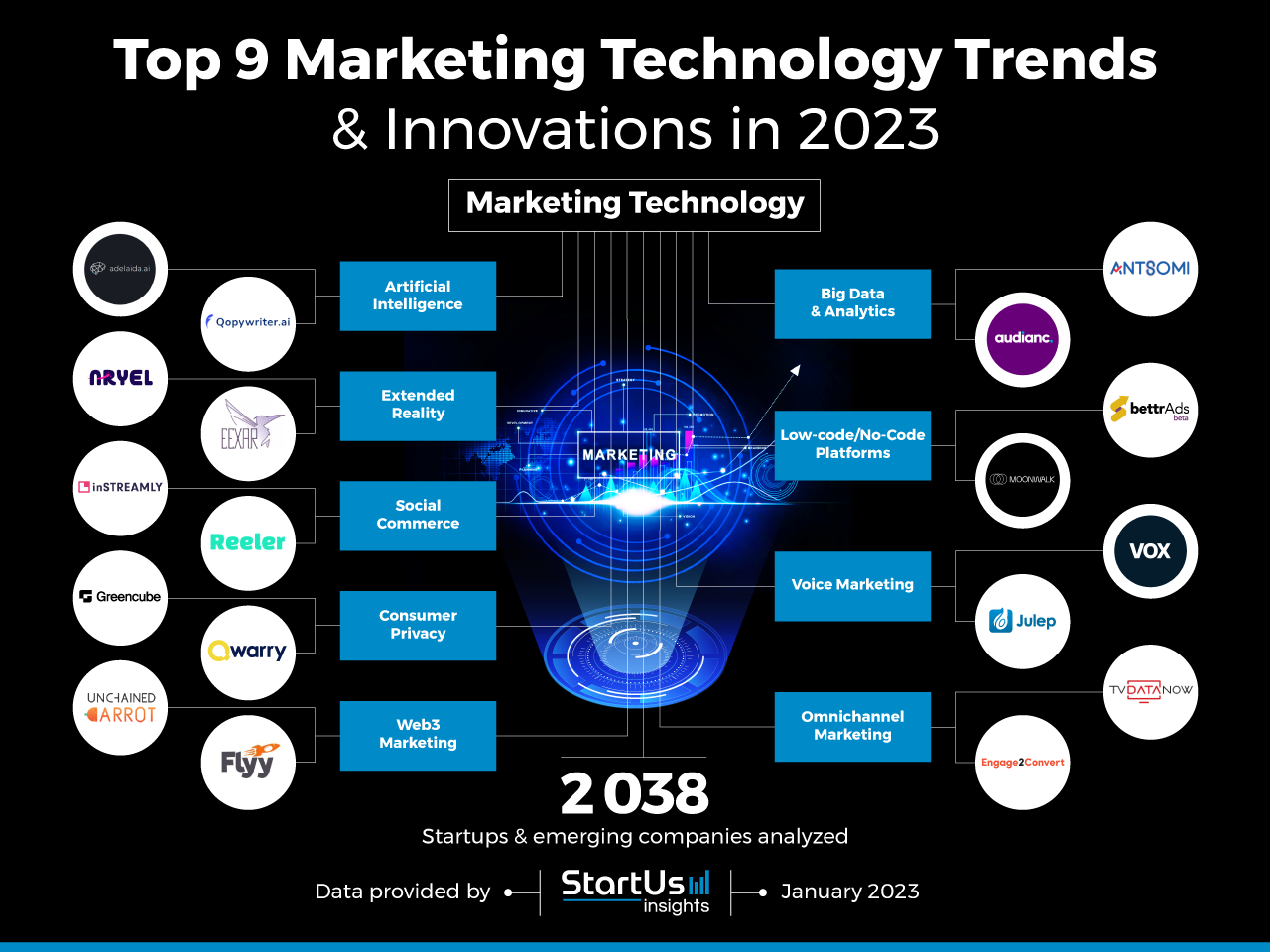Marketing technology (MarTech) enables businesses to manage and measure marketing activities across all customer touchpoints. Companies leverage AI, extended reality (XR), Web3, the metaverse, big data, and analytics. Social commerce and omnichannel marketing remain the top mediums for marketing and advertising, while voice-assisted selling delivers targeted ads at scale. Businesses also use low-code/no-code platforms to automate ad scheduling and performance analysis. Additionally, marketers address consumer data privacy concerns with transparent and intent-based marketing solutions. Read on to learn more about marketing technology trends & innovations.
This article was last updated in July 2024.
Innovation Map outlines the Top 9 Marketing Technology Trends & 18 Promising Startups
For this in-depth research on the Top Marketing Technology Trends & Startups, we analyzed a sample of 2 038 global startups and scaleups. The result of this research is data-driven innovation intelligence that improves strategic decision-making by giving you an overview of emerging technologies & startups in the marketing industry. These insights are derived by working with our Big Data & Artificial Intelligence-powered StartUs Insights Discovery Platform, covering 2 500 000+ startups & scaleups globally. As the world’s largest resource for data on emerging companies, the SaaS platform enables you to identify relevant startups, emerging technologies & future industry trends quickly & exhaustively.
In the Innovation Map below, you get an overview of the Top 9 Marketing Technology Trends & Innovations that impact 2 038 companies worldwide. Moreover, the Marketing Technology Innovation Map reveals 18 hand-picked startups, all working on emerging technologies that advance their field.
Top 9 Marketing Technology Trends
- Artificial Intelligence
- Extended Reality
- Social Commerce
- Consumer Privacy
- Web3 Marketing
- Big Data & Analytics
- Low-Code/No-Code Platforms
- Voice Marketing
- Omnichannel Marketing

Want to explore all Marketing Technology innovations & trends?
Tree Map reveals the Impact of the Top 9 Marketing Technology Trends
Based on the Marketing Technology Innovation Map, the Tree Map below illustrates the impact of the Top 9 Marketing Technology Trends in 2025. AI-powered software solutions streamline the planning, execution, and analysis of marketing activities and consumer journey mapping. Chatbots utilize machine learning (ML) to automate repetitive tasks and create hyper-personalized consumer experiences. XR and Web3 technologies, such as blockchain, non-fungible tokens (NFTs), and the metaverse, also deliver engaging consumer experiences to a global audience.
Livestreaming, voice commerce, and omnichannel marketing is the preferred medium to reach and convert audiences. However, email, connected television (CTV), and over-the-top (OTT) advertising are still growing in popularity. While customer data platforms (CDP) provide a centralized data management tool, low-code/no-code automation provides the self-service capability for marketing automation. Contextual targeting and better utilization of first-party data are important strategies to navigate cookie-less marketing and privacy concerns in 2025.
Global Startup Heat Map covers 2 038 Marketing Technology Startups & Scaleups
The Global Startup Heat Map below highlights the global distribution of the 2 038 exemplary startups & scaleups that we analyzed for this research. Created through the StartUs Insights Discovery Platform, the Heat Map reveals that the US and India have the most marketing technology startup activity, followed by the UK.
Below, you get to meet 18 out of these 2 038 promising startups & scaleups as well as the solutions they develop. These marketing technology startups are hand-picked based on criteria such as founding year, location, funding raised, and more. Depending on your specific needs, your top picks might look entirely different.
Top 9 Marketing Technology Trends for 2025
1. Artificial Intelligence
AI provides insights into consumer behavior and maps the customer journey across all marketing mediums. It automates core marketing activities such as lead generation, behavioral analysis, personalization, customer relationship management (CRM), and other repetitive tasks. This improves workforce productivity and allows marketing managers to create and analyze complex marketing models and increase their return on investment (ROI).
Further, conversational marketing using live chats and chatbots enables 24/7 customer interaction and data collection. AI also aids in intelligible audience segmentation and manages targeted paid marketing such as social media management (SMM) and pay-per-click (PPC) campaigns. Lastly, natural language processing (NLP) enables real-time customer sentiment analysis, delivering relevant and compelling experiences at scale.
Yepp AI develops Content Marketing Platform
Polish startup Yepp AI develops a marketing platform driven by artificial intelligence. It supports marketing agencies by automating content creation through advanced data retrieval and content recycling methods. The platform enhances traffic generation with marketing content, leveraging features like data segmentation and AI-generated buyer personas.
Moreover, it automates the workflows to enhance productivity, minimize errors, and ensure efficiency. This assists with faster project delivery, quicker response times, and rapid decision-making.
Qopywriter.ai provides AI-powered Content Creation
Estonian startup Qopywriter.ai makes an AI-powered content creation platform. The startup’s copywriting tool takes title description and article type as input and utilizes ML and NLP models to generate unique articles. The output content is human-like in quality and meets search engine optimization (SEO) guidelines. This way, Qopywriter.ai automates content creation and marketing tasks for marketing specialists, SEO managers, and copywriters.
2. Extended Reality
Startups are increasingly utilizing augmented and virtual reality (AR/VR) to provide an immersive customer experience and boost engagement. These solutions equip marketers with measurable engagement options such as geo-fenced elements for location-specific targeting, virtual events, and storefronts. XR, along with technologies such as drones, interactive billboards, and holograms, advances experiential and guerilla marketing activities.
Startups are building digital-out-of-home (DOOH) advertising solutions to display dynamic ads and measure returns on advertisement spend (ROAS) in real time. Businesses are also using hybrid events to reach their worldwide audience and measure marketing attribution. Further, ad campaigns with 360-degree videos, holographic projections, and drone light shows are the other applications of XR to capture user attention.
Aryel facilitates AR Ad Campaigns
Aryel is an Italian startup that develops a software platform to create AR-enhanced ad campaigns accessible through smartphones. The startup’s drag-and-drop builder lets users create immersive product visualizations in real-life contexts and enrich marketing campaigns with interactive AR triggers. It also provides real-time interaction and geodata analytics of campaigns and suggestions to improve marketing strategy. Businesses and marketers use the platform to optimize conversion rates, increase customer loyalty, and attract new leads.
EEXAR empowers AR Sales Presentations
Chinese startup EEXAR develops EEXAR Presentation, a sales tech software for AR-powered virtual presentations. It organizes and enables a creative display of business product data by generating AR catalogs, interactive 3D models, and product color versions. The software also guides the presentation audience and monitors attendee activities. Sales and marketing teams leverage it to deliver engaging virtual presentations and drive offline sales.
3. Social Commerce
Live and non-live streaming on social media for product sales, reviews, and consumer interaction continue to increase revenue opportunities for businesses. Such platforms offer a profitable alternative to paid ads and enable consent-based data collection from users. Selling products while live streaming remains the top subtrend in social commerce, followed by vlogs and short-form video content. Additionally, businesses and marketing agencies utilize these means to deliver brand messages, create new trends, and improve customer engagement.
Also, expensive celebrity influencers are being replaced by virtual social media influencers to promote brands and products. Therefore, startups are providing tools to streamline their workflows for better communication between influencers and fans. Further, businesses strive to organically increase their visibility in search rankings as well as to build credibility and leverage user-generated content (UGC) for this purpose.
inStreamly aids Streamer Management
Polish startup inStreamly provides a streamer management platform that connects brands and streaming platforms with micro-streamers. It allows brands to run sponsored content and display campaigns embedded in live streams of several micro-influencers with extremely engaged communities. The platform provides live statistics per campaign per streamer for campaign views, click-through rates (CTRs), and costs per click and acquisition (CPC/CPA). This enables brands to reach their target audience in a non-invasive way and build trust among gen Z users.
Reeler improves UGC Management
Swedish startup Reeler facilitates the collection, organization, and publication of UGC. The startup’s eponymous platform accumulates all content types shared by users from various social media platforms through hashtags or via emails and landing page forms. It enables marketing teams to tag and organize content and build their own media library for use in their marketing campaigns across different channels. This, in turn, empowers brands to boost customer engagement.
4. Consumer Privacy
Providing a personalized experience while maintaining user data privacy is a crucial element for MarTech stacks. The introduction of ad transparency measures from companies such as Apple and Google builds on privacy rights and General Data Protection Regulations (GDPR) concerns. Startups and scaleups are thus offering solutions to target audiences without relying on third-party data obtained from installing cookies or advertising identifiers. These include conventional contextual advertising and intent-based solutions for marketing micro-moments but with better automation.
Such MarTech tools improve call-to-actions (CTAs) using signals like clicks, app installs, page views, sign-ups, etc., where users willingly share their personal data. Technologies such as AI, ML, and blockchain further aid in building trust and transparency-based responsible marketing tools.
LayerFive uses Privacy-Compliant Identity Resolution
US-based LayerFive maximizes visitor engagement and insights with its privacy-first identity resolution technology. The platform doubles the recognition of engaged visitors, enhancing behavioral insights and expanding retargeting audiences. Using LayerFive, B2B customers and Shopify merchants gain deeper visitor understanding and improve personalization across email, SMS, and social channels. Its unified data approach aggregates information from all business aspects, building larger, qualified audiences for impactful marketing. Predictive scoring technology ranks visitor engagement to uncover more qualified leads.
Qwarry offers Contextual Advertising
French startup Qwarry provides an ad tech platform for contextual advertising. It understands the editorial content of a given webpage and provides semantic and brand suitability scoring to gauge relevance for ad placement. The platform uses proprietary ML and natural language understanding (NLU) algorithms to provide scoring and enable real-time bidding (RTB) to display ads on a large assortment of premium websites. This enables advertisers, marketing agencies, and brands to run interest-based ads without using personal user data while complying with GDPR regulations.
5. Web3 Marketing
Web3 marketing aims to decentralize marketing and provide a gamified and interactive user experience. Startups and scaleups utilize blockchain-based tools to enable targeted marketing, decentralized web hosting, ad fraud prevention, and peer-to-peer (P2P) interactions. Brands create hype by issuing NFT collectibles, limited-edition tokens, digital tickets, and digital asset ownership authentication. Web3 marketing further equips marketers to navigate brand relationships from physical to virtual environments while enhancing customer experience. Moreover, Web3 technologies ensure consumer data privacy through their private-by-design infrastructure.
Holder offers CRM and Messaging Platform
US-based startup Holder offers a web3 CRM and messaging platform. The Holder Web3 Marketing Platform enables direct customer engagement through crypto wallets, delivering timely, targeted messages. The CRM feature creates hyper-segmented audiences by leveraging robust wallet data, web3 social identities, and off-chain information. Automation drives deeper engagement with personalized, omnichannel customer journeys, while web3-enabled forms and Holder’s Frame Builder capture leads. The platform enhances wallets with on-chain ownership and activity data, combining it with off-chain data in a next-gen customer data platform (CDP) and web3 system of record.
Flyy gamifies Customer Engagement
Indian startup Flyy develops gamification as a platform to enhance customer engagement in marketing campaigns. Marketing teams use the startup’s plug-and-play modules to create predefined and custom event-based challenges that add gamification to users’ routine actions and referrals. It prompts and incentivizes users for taking preferred actions and delivers rewards through its built-in platform. Flyy enables businesses to design end-to-end customer journeys that increase user engagement, acquisition, and retention.
6. Big Data & Analytics
Big data and analytics optimize data management and real-time analysis of marketing activities across all channels. Businesses are utilizing customer data platforms (CDPs) to leverage zero-part data and offer personalized content. These platforms unify customer data and provide marketing performance and ROI evaluation across key performance indicators (KPIs). Integrated solutions also provide full-cycle reporting, increase productivity as well as manage online reputation and workflows. Further, advanced analytics improves content planning, documentation, and customer retention, greatly benefitting businesses transitioning to digital processes.
Antsomi offers a Customer Data Platform
Singaporean startup Antsomi builds CDP365, an AI-based CDP. It creates a centralized customer view by ingesting data from all customer touchpoints in a single dashboard with multi-dimensional views. The platform utilizes data to activate real-time automation and personalization of marketing activities across online and offline channels. Its application programming interface (API) connects with third-party marketing stacks and allows customer interaction teams to drive customer lifetime value (CLV).
DiGGrowth develops a Marketing Attribution Platform
US-based startup DiGGrowth offers a no-code marketing analytics platform to optimize return on investment for marketing efforts. The platform measures and drives marketing ROI through analytics and attribution features. Data integration centralizes information from ad platforms, CRM, website analytics, and marketing automation platforms, ensuring marketing analytics. Campaign tracking standardizes and enriches campaign metadata, providing clarity and empowering decision-making. Custom dashboards and reports present a view of marketing effectiveness to increase the marketing ROI. Moreover, the platform supports marketing operations managers by unifying disparate platforms and streamlining ROI reporting.
7. Low-Code/No-Code Platforms
Low-code/no-code platforms provide small and traditional businesses with easy-to-use tools for marketing automation. They offer a decentralized self-service capability with their built-in intelligence to optimize repetitive tasks. Although these platforms provide limited personalization, startups are developing such low-code/no-code business intelligence (BI) and CRM software suites that ensure data usage versatility.
Further, predictive analytics, social media ad scheduling, generative AI, and email marketing automation are some features that these tools provide. Other no-code platforms enable app development that empowers businesses to test and deploy new apps quickly and introduce novel revenue opportunities. This improves efficiency, reduces reliance on IT teams, and provides insights for effective decision-making.
BettrAds simplifies Ad Performance Measurement
Brazilian startup BettrAds offers a data warehouse automation tool that measures ad performance. The startup’s eponymous no-code platform automatically measures and reports marketing attribution across multiple channels and provides real-time insights for campaign optimization. It streamlines customer data management by integrating with all digital media and keeps track of KPIs. BettrAds automation reduces time spent by marketing teams on reporting campaign performance and increases team productivity.
Moonwalk accelerates No-Code Web3 Development
US-based startup Moonwalk builds a Web3 platform that advances the development of NFT utilities and Web3 economies. The startup’s MoonwalkLaunchpad toolkit leverages blockchain to facilitate the development of NFTs, tokens, branded wallets, and other Web3-enabled digital assets without any coding knowledge.
Brands and creators use it to launch and distribute their branded NFT collections, tickets, and metaverse-ready digital assets through their own or third-party marketplaces. Moreover, it enables brands to build communities and engage with their audience by offering closed-loop social or play-to-earn (P2E) rewards.
8. Voice Marketing
Increased market penetration of smart speakers and virtual assistants through smartphones and mobile devices are directly impacting voice searches. Marketers are capitalizing on this growth by advancing voice commerce, programmatic audio advertising, and remarketing. Voice-assisted selling or voice commerce solutions range from improving user experience (UX) design for voice content to AI-powered upsell and cross-sell suggestions.
Music streaming services and podcasting are also privacy-safe avenues to deliver ads to highly engaged and targetable audiences at scale. Startups are developing solutions such as editing and hosting platforms, quality equipment, and marketplaces to connect podcasters with brands. Voice commands are intent-based and therefore improve content visibility and brand awareness.
VOX develops Voice Assistants
Malaysian startup VOX provides a conversational AI platform to develop voice assistants and voice-enabled applications for chatbots. Its voice assistants automatically generate human-like conversations and engage with users in a personalized manner. Further, the platform utilizes predictive modeling, big data, and analytics to analyze conversational data and create consumer archetypes for better engagement. Brands and businesses use VOX to connect with customers across their preferred channels, reduce wait time, and maximize operational efficiency.
Julep simplifies Podcast Hosting
German startup Julep offers a platform for podcast monetization, hosting, and production as well as a marketplace to connect podcasters and advertisers. It features premium audio quality, content storage, multi-platform publishing, and performance insights. The platform also supports dynamic ad insertion technology for scheduling and replacing brand advertising campaigns in individual episodes. Podcasters use Julep’s solution to monetize their content and increase outreach while advertisers use it to implement podcast ads and target niche audiences.
9. Omnichannel Marketing
Effective audience positioning and targeting require an omnichannel marketing strategy. Startups are developing marketing technologies that enable campaign management across SMS, email, phone calls, and chatbots through a single platform. Additionally, demographic and behavioral targeting based on third-party data is departing, forcing marketers to utilize CTV and OTTs to display relevant ads.
Moreover, content becomes the key to determining the right audience fit and forming relevant audience segments. Omnichannel marketing automation and programmatic advertisement in all forms of media are areas where startups are building innovative solutions.
Tofu Technologies offers Omnichannel Personalization
US-based Tofu Technologies offers a platform for omnichannel personalization at scale, enabling targeted marketing across various channels. The platform supports 1:1 campaigns, providing customer insights and content creation. Industry-specific content customization personalizes emails, landing pages, white papers, sales decks, and ads with market-specific pain points and value propositions.
Persona-based customization ensures the right message and content for each persona within complex buying groups, shortening sales cycles and increasing deal success. The technology automates the personalization process, delivering tailored content instantly to various customer segments. This enhances engagement and conversion rates by addressing specific needs and preferences across channels.
Wapping aids Omnichannel Loyalty Management
Wapping is a Spanish startup that develops an omnichannel loyalty management platform. It combines commerce and customer data management (CDM) to bring online and offline channels into a single dashboard. The platform uses this data to analyze consumption habits, dropouts, and customer satisfaction, among others. This enables retailers to better plan upselling and cross-selling efforts as well as offer personalized experiences. Consequently, Wapping’s platform improves conversion and retention rates, sales, and customer satisfaction.
Discover all Marketing Technologies, Trends, & Startups
In the future of MarTech, the use of metaverse and Web3 marketing shows an upward growth trend. It then becomes imperative for each of these solutions to be optimized for mobile devices. Startups already experiment with wearables and the IoT to provide unique marketing experiences. These technologies further enable first-party data collection and effective ad serving. Moreover, the growing concerns around data privacy will force stronger regulations and policies in data management.
The Marketing Technology Trends & Startups outlined in this report only scratch the surface of trends that we identified during our data-driven innovation and startup scouting process. Among others, Web3, AI, blockchain, and XR will transform the sector as we know it today. Identifying new opportunities and emerging technologies to implement into your business goes a long way in gaining a competitive advantage. Get in touch to quickly and exhaustively scout startups, technologies & trends that matter to you!



 WATCH THE VIDEO VERSION
WATCH THE VIDEO VERSION 








